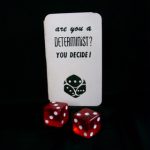Until its proved otherwise, why not assume that consciousness does not play a significant role in human behavior? Although the idea might seem radical at first, it is actually the conservative position, the one that makes the fewest assumptions. The null position is an antidote to philosophers’ disease — the inappropriate attribution of rational, conscious control over processes that may be irrational and unconscious. The argument is not that we lack consciousness but that we overestimate the conscious control of behavior. — Robert R. Provine, p. 147 in What We Believe But Cannot Prove: Today’s Leading Thinkers On Science in the Age of Uncertainty, 2006.
Robert R. Provine is a professor of psychology and neuroscience at the University of Maryland, Baltimore County. He is the author of Laughter: A Scientific Investigation. And I am sharing his little spiel in the book What We Believe But Cannot Prove because he expresses an idea that I have toyed with ever since I learned of those experiments testing half-brain functions that show that people really do quite sincerely and unknowingly fabricate false reasons for why thy make certain decisions. But needless to say, I’m sure, not a few people are quite disturbed whenever I even raise the possibility. So I have learned to keep my suspicions closer to my chest but here in this post I bare all with the encouragement of a leading thinker under the title “things we believe but cannot prove.”
Provine continues:
We are misled by an inner voice that generates a reasonable but often fallacious narrative and explanation of our actions. That the beam of conscious awareness illuminating our actions is on only part of the time further complicates our task. Since we are not conscious of our state of unconsciousness, we vastly overestimate the amount of time that we are aware of our actions, whatever their cause.
Robert Provine’s thoughts about unconscious control, unlike my amateur cogitations, were shaped by his field studies of “the primitive play-vocalization of laughter.” He found that when he asked people why they laughed in certain situations the answers they gave, he could demonstrate through careful observations, were wrong. They merely concocted rationalizations for their behaviour. Continue reading “Day by day with eyes wide shut (What if our conscious reasoning is an afterthought?)”

